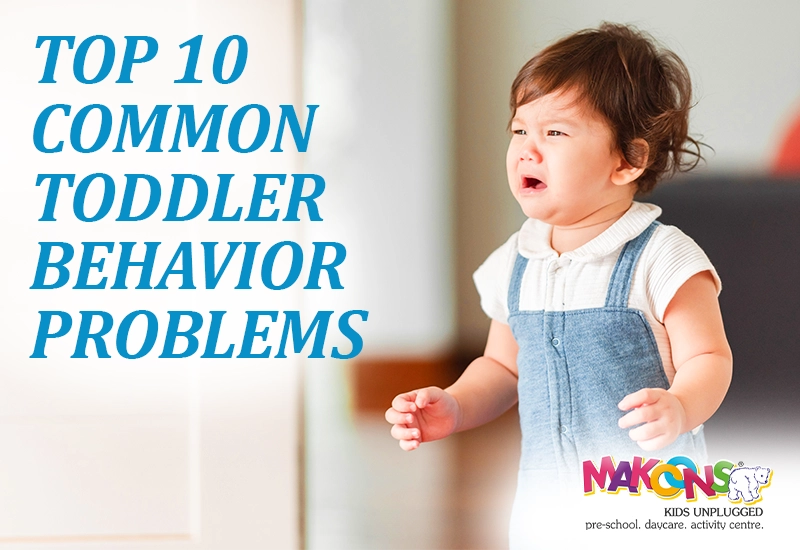Raising a toddler is one of the most rewarding and sometimes overwhelming parts of parenting. At this age, kids are growing fast in every way: physically, socially and emotionally. But they don’t even have the words to express it all yet.
The top ten toddler problems will be discussed in this blog, along with professional suggestions for managing tantrums, establishing limits, and employing successful toddler discipline techniques.
1. Emotional Outburst and Tantrums
Tantrums are perhaps the most well known of all the behavioural problems. It usually happens when kids are tired, frustrated or can’t express what they’re feeling. It’s true that happens a lot at this age.
How to deal with it:
- Stay Calm: Your response sets the tone. Avoid yelling or get worked up.
- Validate their emotions: Saying something like “ I know you’re upset because you can’t have that cycle,”.
- Give Choices: By giving simple choices, such as “Do you want the pink or the green one?”
- Use straightforward language to assist your child in thinking back on the outburst once they have calmed down.
Over time, helping kids develop emotional self-control requires knowing how to deal with toddler tantrums.
2. Aggression: Kicking, Biting, and Hitting
Biting it hitting can be a Toddler’s way of expressing feelings just to ensure how to communicate. These behaviours are concerning even though it’s pretty common at this age.
Toddler parenting advice:
- Step in right away: Say something like, “No hitting,” which is firm but gentle. That is painful.
- Give pupils alternatives: Encourage people to express their emotions through words or body language.
- You can demonstrate empathy by teaching your child how to comfort someone they have offended or offer an apology.
- Be dependable: Children learn boundaries through repetition.
Toddlers who feel understood and supported tend to be less aggressive.
3. Food Refusal and Picky Eating
Picky eating is one of the most annoying common toddler problems. Food rejection in toddlers can occur due to taste, texture, or simply mood.
How to handle it:
- Steer clear of pressure: Making a child eat against their will can lead to a bad relationship with food.
- Serve a range of Present a variety of healthful foods without requiring them to consume them all.
- Keep it entertaining by using vibrant plates or letting young children help prepare meals.
- Have patience: New foods are frequently accepted after repeated exposure.
Making mealtimes enjoyable requires consistency and a laid-back demeanor.
3. Not listening and Ignoring Instructions.
Toddlers are inherently curious and have a short attention span. They occasionally seem to willfully disobey parents or disregard instructions.
Methods for toddler discipline :
- Reach eye level: Make sure your child is looking at you as you speak directly to them.
- Use straightforward, unambiguous instructions: Steer clear of lengthy explanations.
- Praise the Positive reinforcement is effective, so acknowledge when they follow instructions.
- Establish consequences: Reasonable penalties, such as tidying up a mess, aid in reinforcing regulations.
As toddlers gain greater self-regulation, their listening skills improve with practice.
5. Whining and Attention-Seeking
Whining is something that every kid does. It usually happens when they’re feeling tired, frustrated and ignored. It’s their way of saying, “Hey I need you!”
Toddler parenting advice:
- Develop a “big kid” voice: Remind your child politely to ask.
- Reward good communication by complimenting them when they use polite language.
- Ignore minor complaints: Negative behavior can be reinforced by attention.
- Proactively show attention: Take time to talk to someone one-on-one to avoid the need to act out.
- Reducing whining can be achieved by identifying its root cause.
6 Separation-Related Anxiety
Separation anxiety is really common and difficult for toddlers and parents. It’s hard to say goodbye during transitions like beginning daycare or preschool.
Here are the ways to make it easier:
- Create a goodbye routine: Special hugs, kisses, and waves can be comforting.
- Stay calm and positive: Your confidence makes them feel safe and secure too.
- Always say goodbye: To keep them from feeling abandoned.
- Retain consistency: Toddlers gain from consistent routines that facilitate adjustment.
A typical developmental stage, separation anxiety typically gets better with age.
7. Resistance to Potty Training
Toddlers and parents sometimes find toilet training to be a difficult task. Some children simply aren’t ready for it for a variety of reasons, including fear or discomfort; some children just aren’t ready for it and that’s quite fine.
Here are some simple ways to make it smoother:
- Don’t rush: If your child is staying dry for longer then it might be ready. Go at their own speed.
- Make it fun: Try books, music, or stickers to keep your child engaged.
- Be Comforting: Let your child know that mistakes are a part of learning and that they are safe and supported.
- Celebrate the wins: A little praise can boost their self confidence.
8. Tossing Things
Toddlers love to throw things, it’s how they find out how the world works. But yes, it can get messy and even a little bit risky. Instead of getting frustrated, stay calm, patient and consistent. They’re just learning.
- Take the item away: Remove the object being thrown calmly.
- Calmly explain: “We don’t throw things inside. That might shatter.
- Provide a secure substitute: Provide designated “throw zones” or soft balls.
- Congratulate soft play and reinforce desired conduct.
This is an excellent chance to impart self-control and spatial awareness.
9. Shyness and Clinginess
Some toddlers develop strong attachments to their parents and become resistant to playing by themselves or interacting with other people.
Toddler parenting advice:
- Gradually increase your level of independence by beginning with quick local solo activities.
- Provide comfort: Don’t be overly protective, but do comfort them.
- Set up playdates for small groups to promote social play.
- Recognize minor successes and give them credit for attempting something new on their own.
- Respecting your child’s pace will make them feel safer and more independent.
10. Night Waking and Bedtime Battles
One of the toughest things parents have to do is get their young children asleep. Little children should be quite normal in struggling with falling asleep or waking up several times during the night.
So, what can actually help?
- Make a relaxing bedtime routine that might include a story, a lullaby, or even a warm bath.
- Try to avoid screens atleast an hour before bed. The blue lights from devices can interfere with melatonin production.
- Maintain the same sleeping area, same bed, same favourite stuffed toy- which help toddlers feel safe, secure and easy to sleep.
- When they wake up at night – avoid talking , speak softly and keep the lights dim. The aim is to gently reassure them not fully wake them up.
- Good sleep practices promote cognitive development and are advantageous to the whole family.
Also Read :- Why Is My Child So Clingy? Causes and Comforting Solutions
Concluding Remarks
The toddler years can be such a wonderful ride but a tough one too. When parents know what to expect, it all becomes a lil bit easier. Even the challenging times actually help your child to guide, teach and grow a bit closer together. Every meltdown, every feeling is a way to connect and help your little one to grow and learn.


